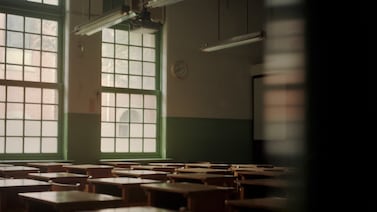Freshman Jude Mys listens to music in the hallways to clear his head between classes at Pioneer High School in Ann Arbor.
Junior Jeffrey James texts throughout the day to check in with his girlfriend, senior Mahli Madrid, and confirm after-school plans.
Senior Aniya Kidd uses her phone during the school day to keep track of assignments her teachers post online.
None of that would be permitted under a Michigan House bill that would require school districts to prohibit the use of personal cellular devices during the school day.
The bill, sponsored by state Rep. Gary Eisen, a Republican from St. Clair Township, reflects growing concern among Michigan lawmakers and educators about digital distractions in school. As they confront lingering academic and mental-health crises, some districts have cracked down on cellphone use at school, while others have issued stern warnings to parents about the negative effects social media can have on student learning and socialization.
Those who support restrictions on cellphones and social media say stricter rules are likely to help students get back on track after the pandemic pushed many into distraction-ridden online classrooms.
But the bill raises concerns for parents like Symone Wilkes who want their children to be able to reach them in case of emergency.
“You’ve got to think about what’s going on in the world today,” said Wilkes, who has a kindergartener at MacDowell Preparatory Academy in Detroit and a niece at River Rouge High School whom she helps take care of. “There might be another mass shooting. How is a kid going to be able to call the police? They have to wait until the shooting stops to go to the principal’s office to make the call?”
Students say they rely on their phones for day-to-day tasks such as arranging rides home, texting parents, communicating with teachers, and checking online assignments. Some even take notes on mental health triggers that they later share with a therapist, one Pioneer student said.
They also admit to using phones to play games and scroll through social media when they don’t feel like paying attention in class.
“Sometimes it is a distraction, like when you’re just bored so you’re on it,” said Madrid, 16.
Several Pioneer students waiting at a city bus stop after school — most with phones in hand — said they understood banning phones during class time, but not during free time between periods or at lunch.
Those rules should be up to teachers and principals, not state lawmakers, they said.
“For certain students, phones could be a distraction, and if it becomes an issue, that’s between the teacher and that class,” said Kidd, 17.
Jametta Lilly, CEO of the Detroit Parent Network, said she trusts district leaders and charter school operators to put the right rules in place for the communities they serve.
“I’m comfortable with the state requiring school districts to come up with a policy, but I’m uncomfortable with an automatic, flat prohibition,” said Lilly, whose group advocates for quality education for Detroit children.
The two-sentence bill, which is now before the House Education Committee, does not provide for any exceptions. Eisen, the bill sponsor, could not be reached for comment Wednesday, Thursday or Friday.
Currently, cellphone policies are set by local school officials.
A new policy at MacDonald Middle School in East Lansing, for example, requires students to keep their cellphones off and stored during the school day. It also implores parents to keep their children off social networks such as Snapchat and Instagram, calling the sites a “scourge to their childhood, devastating their mental health, sense of safety, and self worth.”
When conflicts arise among students on social platforms, the policy says, school officials will ask parents to deal with the issue in most cases.
“Gone are the days where a child can escape a difficult situation after the school day,” John Atkinson, assistant principal at the school, said in an email. “Now, students endure unimaginable social or emotional distress because they cannot escape it. It’s not just the mean post or picture, it’s all of the ‘likes’ and ‘shares’ that are equally painful… . Can you imagine how painful that would be for a 12-year-old?”
Rylie McClean, a recent graduate of East Lansing High School, said she understands the thinking behind the policy. “My senior year of high school, I was harassed online and in school,” she said in a text message. “The threats got so intense and my mental health got so bad that I ended up missing school.”
But she added that she would struggle without access to her phone during the day, and that she ultimately views social media as a helpful way to meet new people and talk with her friends.
In Reeths-Puffer schools near Muskegon, students may use phones before and after school, at lunch, and during passing time between classes. They are not allowed during class time unless a teacher allows them for an educational purpose.
In the Forest Hills district near Grand Rapids, though, cellphone use is strictly prohibited during the school day.
In Saline Area Schools near Ann Arbor, students are prohibited from using cellphones during the school day unless they have been authorized to use them for a specific purpose.
Sarah Giddings, whose daughters attend Heritage Elementary and Saline Middle School, says that as a parent, she’s OK with that policy. But as an alternative high school teacher and adviser in another district, she isn’t so sure it would work.
Giddings texts with students daily during the school day at Washtenaw Alliance for Virtual Education, which customizes education plans and class schedules to meet the needs of students who aren’t well served in traditional high schools. Instruction is offered both in person and remotely.
Giddings said students feel safer with cellphones nearby, particularly after the shooting a year ago at Oxford High School in neighboring Oakland County.
“I think a lot of high school students are feeling really raw and want to be able to contact their parents in the middle of the day,” she said. “They want their phones nearby and accessible.”
More than 100 students called police from cellphones at Oxford High School on Nov. 30 as a 15-year-old gunman killed four students and wounded many more. Others called and texted loved ones from behind barricaded classroom doors. At least one recorded the chaos in a cellphone video that later went viral on social media.
Wilkes, the Detroit parent, said her 5-year-old son, Dyson, is too young for a cellphone, but he wears a wristwatch that can be used to make video calls. “If it’s an emergency, he knows how to press my picture and call me,” Wilkes said.
Eisen’s bill wouldn’t prevent students from carrying phones — just using them. But Giddings said a strict policy could contribute to students’ anxiety.
Still, she said, a few rules around cellphone use could be helpful.
“Are teenagers making the smartest decisions about cellphones? No they’re not,” she said. “They’re using it as a distraction device like adults do. The difference is they don’t have the self-control to say, ‘This is affecting my work. I need to put it down,’ like an adult would.”
Tracie Mauriello covers state education policy for Chalkbeat Detroit and Bridge Michigan. Reach her at tmauriello@chalkbeat.org.
Koby Levin is a reporter for Chalkbeat Detroit covering K-12 schools and early childhood education. Contact Koby at klevin@chalkbeat.org.






